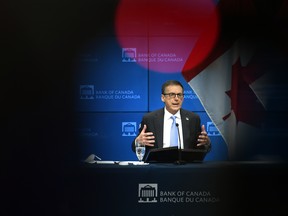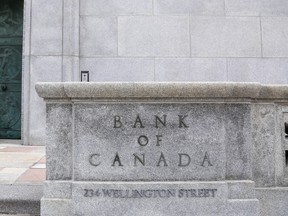Kevin Carmichael: Recession, soft landing may be determined by how much higher interest rates deter business growth plans
Article content
Taiga Motors Corp. probably deserved better this week.
Advertisement 2
Article content
The Lasalle, Que.-based company announced it had delivered the world’s first electric personal watercraft, a significant milestone that attracted congratulations from federal Industry Minister François-Philippe Champagne and Quebec’s Minister of Economy and Innovation Pierre Fitzgibbon.
It had all the makings of a good summer business story and Samuel Bruneau, Taiga’s co-founder and chief executive, wanted to talk about his company’s achievement. Just one problem: Bank of Canada governor Tiff Macklem dropped a bomb that blew every other economic storyline out of the water, even the world’s first battery-powered water scooter.
The Bank of Canada’s decision to raise interest rates by a full percentage point was a shot heard round the financial world; the most aggressive move by a rich-world central bank to date in the global struggle against inflation, stirring speculation that the United States Federal Reserve could do the same.
Advertisement 3
Article content
Macklem made a point of saying he disliked the characterization of his policy decision as “panic,” even though central banks typically adjust borrowing costs with quarter-point moves. The Bank of Canada’s decision followed an updated forecast that has year-over-year increases in the consumer price index accelerating to eight per cent this summer, an alarming number for a group of policymakers charged with keeping inflation at about two per cent.
The governor expressed empathy for those who end up getting squeezed by the abrupt shift in interest rates, but he didn’t apologize. “The way to protect people from high inflation is to eliminate it,” he said in his opening remarks at his quarterly press conference. “That’s our job and we’re determined to do it.”
Advertisement 4
Article content
How determined? It would appear Macklem and his deputies are prepared to stomach a recession if that’s what it takes.
To be sure, that’s not the base case. The central bank is betting it can avoid the worst-case scenario and achieve what economists call a “soft landing” from elevated levels of growth.
The way to protect people from high inflation is to eliminate it
Tiff Macklem
The Bank of Canada’s favourite gauge of the economy’s temperature is the “output gap,” which estimates the difference between gross domestic product and the amount of goods and services the central bank thinks the economy can produce without stoking inflation.
Its estimate of the output gap in the second quarter was between 0.5 per cent and 1.5 per cent, up from an estimate of between -0.25 per cent and 0.75 per cent in the first quarter, suggesting that “excess demand” grew, as households and companies were lining up to purchase more goods and services than the economy had capacity to produce. That produces scarcity, which drives up prices.
Advertisement 5
Article content
The central bank can’t do much about supply, but it can influence demand, and it is now bent on curbing our desire to buy stuff.
The central bank … is now bent on curbing our desire to buy stuff
“The only way for the (Bank of Canada) to lower inflation is by slowing the domestic economy, creating excess capacity and reducing domestic inflationary pressures,” Charles St-Arnaud, chief economist at Alberta Central and a former staffer at the central bank, said in a note. “This is a balancing act that will lead to a period of economic underperformance, notably in the labour market and consumer spending. Whether it will be a soft landing or a recession remains to be determined.”
The determining factor could be the extent to which higher interest rates — and all the volatility they’re whipping up in financial markets — deter executives such as Bruneau from following through on expansion plans.
Advertisement 6
Article content
Real estate, which now represents about 13 per cent of Canada’s gross domestic product, compared with about 11 per cent at the start of the low-interest-rate era in 2008, will be a significant drag on growth for at least the next couple of years, according to the Bank of Canada’s outlook.
Interest rates have risen more in the past four months than they did over the decade between the Great Recession and the COVID-19 crisis, and some of the world’s frothiest housing markets are deflating quickly. The average price of an existing home was $665,850 in June, down two per cent from a year earlier and six per cent from May, according to the Canadian Real Estate Association.

The Bank of Canada now predicts housing will subtract 0.6 percentage points from economic growth in 2023, a much heavier toll than the 0.2-percentage-point drag it was expecting earlier this year.
Advertisement 7
Article content
Still, the Bank of Canada predicts the economy will manage growth of 1.8 per cent next year, down from 3.5 per cent in 2022, but a decent trajectory by pre-pandemic standards. Consumption and government spending will provide some support, but nothing like in recent years, as higher costs for essentials such as food, fuel and rent are eating up more of households’ disposable incomes, and politicians have promised to curb spending after deploying an unprecedented amount of fiscal stimulus while fighting the COVID-19 recession.
That leaves business investment, which for much of the past decade has tended to disappoint forecasters. But there are good reasons to think business spending will hold up. Demand will fade, but it’s difficult to envision household spending reversing, given that savings rates are unusually high and the unemployment rate is at a record low.
Advertisement 8
Article content
-

Exclusive: Tiff Macklem on the Bank of Canada’s surprise rate hike, wrestling inflation and its forecast miss
-

What the Bank of Canada’s full percentage point hike means for the housing market and your mortgage
-

Bank of Canada issues shock rate hike in effort to crush inflation
-

What economists are saying about Bank of Canada’s steep rate increase
“We have no problem staying afloat because we’re growing,” Peter Ruis, president of Indigo Books & Music Inc., told the Financial Post’s Bianca Bharti after the Bank of Canada increased interest rates. “We worked through COVID. We will work through this and who knows where it will go at the moment. We’re still talking about there being GDP growth, so that’s a positive thing. And we’re still talking about there being money in Canadian consumers’ accounts.”
Advertisement 9
Article content
Mark Carney, the former Bank of Canada governor, told a conference in Montreal this week that the world is experiencing a “hinge moment in history,” as economic and geopolitical paradigms are resetting in real time. That’s jarring, but it’s also a massive opportunity for companies that have the wherewithal to take advantage.

Taiga is one of those companies. Bruneau talks about turning his company into the “Tesla of powersports,” disrupting markets for snowmobiles and jet skis in the same way Elon Musk made electric automobiles mainstream. He doesn’t anticipate higher interest rates hurting Taiga in the short term, because the company is working through a backlog of orders. However, he conceded the cost of his expansion plans — the kind of investment that will be necessary to offset a recession — just went up.
“On product demand, we’re not seeing an impact at the moment,” Bruneau told the Financial Post’s Marisa Coulton. Projects “might cost more than we projected,” he added. “So we’re having to adjust and budget for that on our side, and start preparing for this.”
• Email: kcarmichael@postmedia.com | Twitter: carmichaelkevin
Advertisement
Canadian economy soft landing could rest with business confidence
2022-07-15 19:07:15





